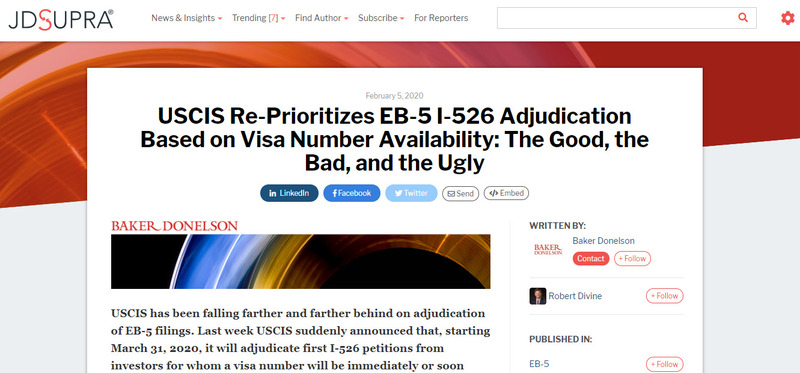USCIS Re-Prioritizes EB-5 I-526 Adjudication Based on Visa Number Availability: The Good, the Bad, and the Ugly
USCIS has been falling farther and farther behind on adjudication of EB-5 filings. Last week USCIS suddenly announced that, starting March 31, 2020, it will adjudicate first I-526 petitions from investors for whom a visa number will be immediately or soon available. The rationale is that investors from visa backlogged countries (mainland China, Vietnam, and India) would not be able to use the I-526 approval if USCIS adjudicated them more quickly, so the agency is allocating resources where they will be more immediately useful.
The Good
This is only good news for investors from the non-backlogged countries. Already they get to jump ahead of the backlogged countries in allocation of visa numbers, and now they get to grab those visas even faster.
For visa-backlogged investors, there is a merciful aspect to the adjudication delay they will experience: Under the Child Status Protection Act, a derivative child's "adjusted age" is deemed "frozen" while the I-526 petition is being adjudicated, and once the I-526 is approved the child's adjusted age resumes advancing toward the limit of age 21 before the visa number becomes available. Thus, delayed I-526 adjudication reduces the chances the child will "age out" of visa eligibility. With such long visa waits anticipated, this is a meaningful restraint for some families.
The Bad
With increasing rates of I-526 denial, resulting from increased scrutiny of investor source of funds and from exposure of failed project plans as time goes on, investors from backlogged countries will be frustrated to wait several years to find out whether their petition will be approved or not. It is not at all clear how USCIS will administer its "prioritization" as a practical matter, at least to make sure that petitions are adjudicated well before investors would be eligible to start processing under the "Dates for Filing" charts in the Visa Bulletin.
The Ugly
That frustration will be multiplied if the project was approvable initially (and perhaps resulted in approvals of petitions by fellow investors from non-backlogged countries), but then becomes denied by the time USCIS gets around to the backlogged petitioners on the basis that the project plans stalled, the capital was mismanaged or diverted to improper uses, or the regional center's USCIS designation was terminated. If USCIS had adjudicated more timely and approved early on, then even if USCIS later revoked the petition the investor would be able to take advantage of USCIS's new regulation allowing the investor to retain the priority date from that I-526 petition – the place in the visa queue marked by the I-526 filing date – in filing a new petition based on a different investment (either with money recovered from the original investment or with new capital).
As USCIS explained in the preamble to its recent regulation, "priority date retention" is meant to have the effect of tending to protect innocent investors from some of the effects of poorly or maliciously executed business plans by people operating investment and project entities and from regional center terminations. The people most at risk for losing their immigration benefit through such events are the people who must wait the longest for a visa number, because there is more time for bad things to happen, whereas people who can immigrate quickly are protected by USCIS policy from many ill effects (i.e., termination of RC or other material change does not affect them, and failure of the business after job creation does not lose their immigration benefit). But this new visa availability approach leaves them unapproved for much longer, and by the time USCIS gets around to adjudicating their petition, bad things might have happened leading USCIS to deny their I-526, losing their place in the visa queue that they would have been able to retain if adjudicated and approved earlier on.
I have made a comment to USCIS with a proposed solution: If the original plan was approvable when filed but has become infeasible as reflected by subsequent events (or lack of progress), then the I-526 petition should be first approved – in order to afford priority date retention – but then can be promptly revoked, which by the regulation does not prevent priority date retention unless the alien is somehow responsible or what led to revocation. Another proposal is to have USCIS amend the regulation to create some type of "as filed" petition approval that can be used or priority date retention while still denying the petition based on facts as of the time of adjudication. Without this solution, USCIS is subject to class-based litigation to rectify this problem.
Another, better solution is for USCIS to staff up and get the petitions all adjudicated quickly. We should not hold our breath for that.
https://www.jdsupra.com/legalnews/uscis-re-prioritizes-eb-5-i-526-17996/
Mentions
States
- New York
Securities Disclaimer
This website is for informational purposes only and does not constitute an offer or solicitation to sell shares or securities. Any such offer or solicitation will be made only by means of an investment's confidential Offering Memorandum and in accordance with the terms of all applicable securities and other laws. This website does not constitute or form part of, and should not be construed as, any offer for sale or subscription of, or any invitation to offer to buy or subscribe for, any securities, nor should it or any part of it form the basis of, or be relied on in any connection with, any contract or commitment whatsoever. EB5Projects.com LLC and its affiliates expressly disclaim any and all responsibility for any direct or consequential loss or damage of any kind whatsoever arising directly or indirectly from: (i) reliance on any information contained in the website, (ii) any error, omission or inaccuracy in any such information or (iii) any action resulting therefrom.




